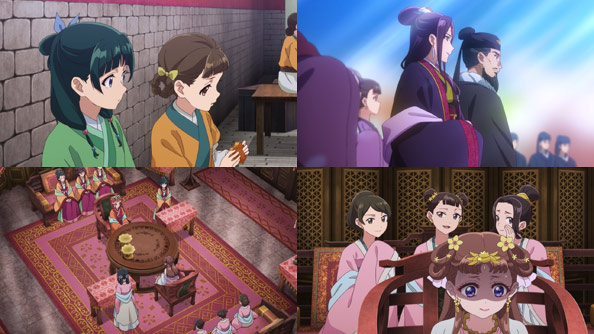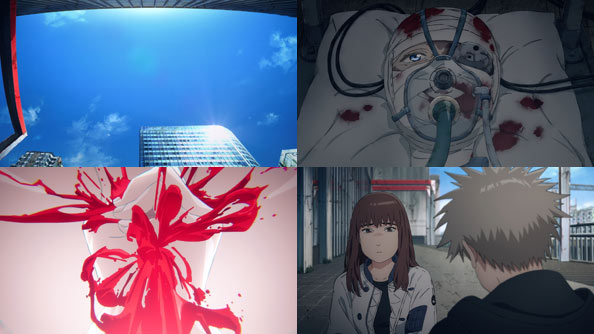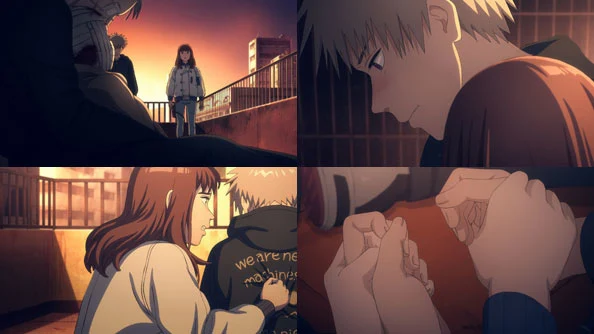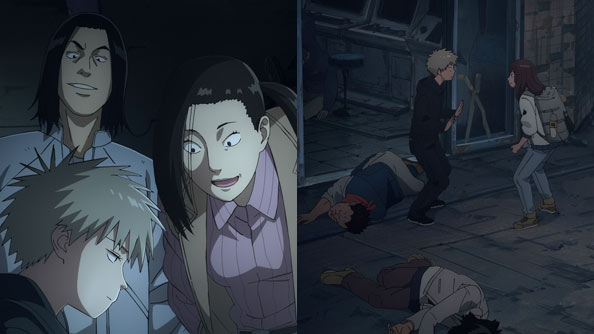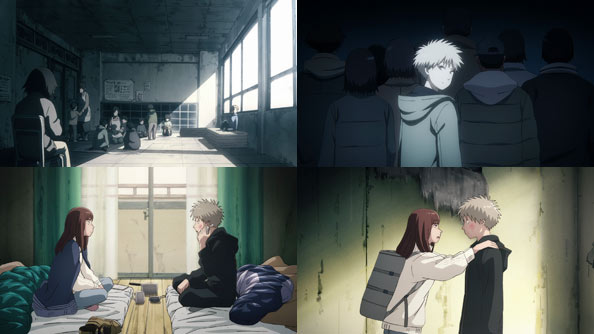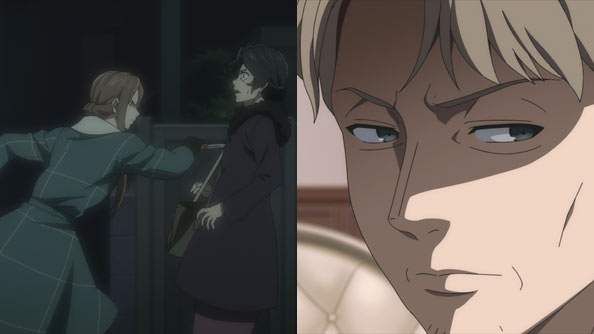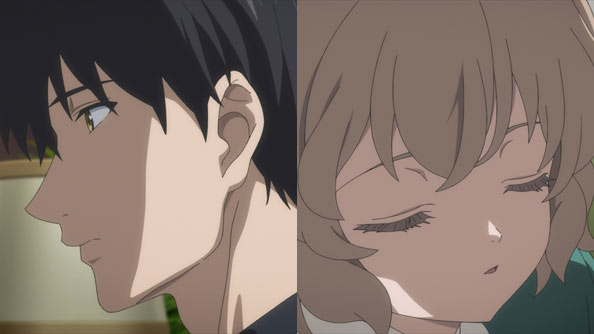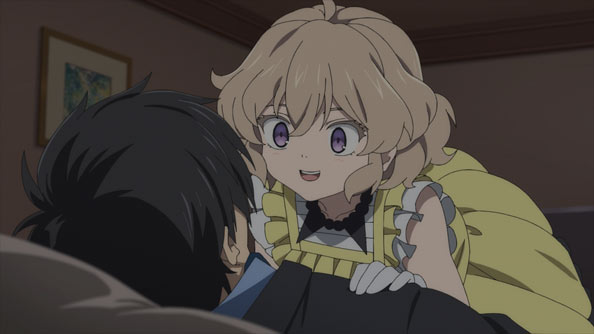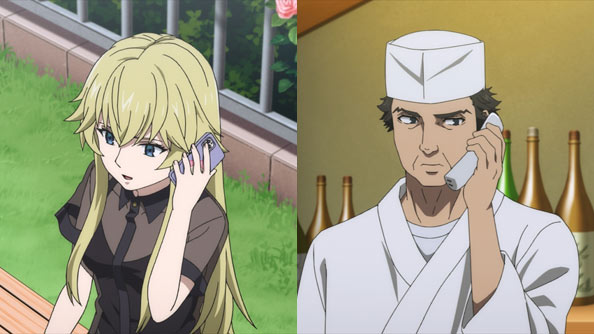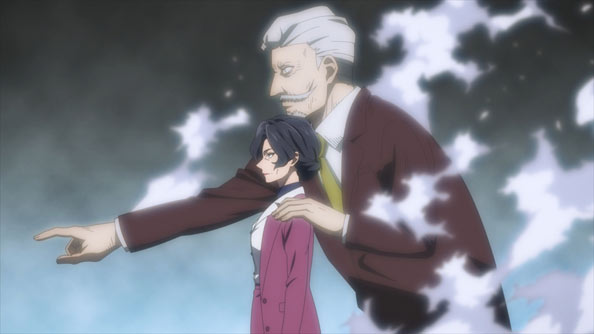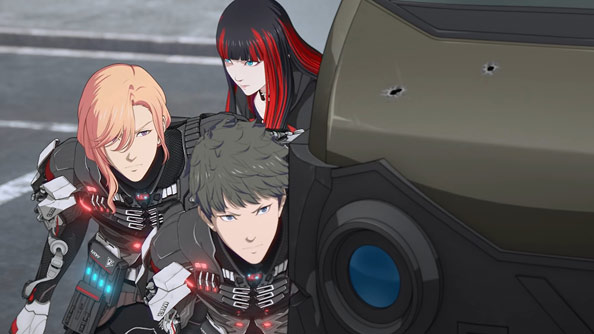
Like Sayu, I was dreading the day someone from her family finally found her and forced her to come home…but that isn’t what happens. It turns out Issa is just as decent and kind a person as Yoshida, and doesn’t jump to conclusions even when Yoshida and Sayu greet him at the door in their PJs.
Instead, he’s the latest in a long line of refreshingly reasonable, level-headed human beings that populate Higehiro and make it feel more real. He’s not simply doing their mother’s bidding; he wanted to be the one who found Sayu, because he loves her and is worried about her.
Issa is greatly relieved Sayu managed to find a good soul who took her in without asking for anything inappropriate, and takes both of them at their word when they say nothing’s happened. As a high-achieving corporate type, I imagine Issa trusts his instincts when it comes to reading people.
But that’s not all: Issa can also tell, even if Sayu can’t, that she’s taken some important steps forward as a person. He notes how she’s more able to speak her mind, as she explains why she needs a few more days to think about things. He’s proud and caring n a way only a big brother can be, and grants her one more week.

I have to say, I never imagined in a million years that Issa would be such a good guy, especially considering the uncomfortable way the series has handled the bastard who took her in for sex and ended up her co-worker. But it’s not the show’s fault I automatically expect the worst…it’s because men, and especially anime men, are so often just that…the worst.
Of course, women are the worst too, as we learn when Sayu invites Asami over and sits her and Yoshida down to finally tell them about everything that’s happened that led her to run away. In effect, she’s unloading all of the burdens she’s carried before two friends who are all too happy to help share that load. Her first step in getting ready to go back is telling the people important to her about where she came from.
Sayu and her mother never got along. Her mother put all of her hopes and aspirations into her firstborn son Issa, and never had a kind word for Sayu. Because she never received love, Sayu didn’t bother putting any effort into anything, be it academics or socializing. She was alone, emanated a “stay away” aura, and came to prefer it that way.
But along came another outcast in Yuuko, for whom Sayu’s repelling aura had the opposite effect. Yuuko always told Sayu she was pretty and cool—as pretty and cool as Yuuko claimed not to be—and the two became fast, close friends. But Sayu’s looks and unimpeachable “goodness” kept the other girls from bullying her directly when she turned down a guy one of them liked, so they started bullying Yuuko instead.

Yuuko always said Sayu looked best when she was smiling and happy. But as the bullying intensified and Sayu dug in her heels, determined to stand beside Yuuko and fight for her, she stopped smiling and laughing, and was always depressed, because she felt responsible for her friend’s suffering and felt powerless to stop it.
Yuuko, however, felt differently. When Sayu told her she’d support her and fight for her against the bullying, it hurt Yuuko more than anything, as she believed she was ruining Sayu’s happiness by deigning to become friends with her in the first place.
So one day, Sayu found Yuuko standing on the wrong side of the balcony, waiting for her. Yuuko told her what happened was her fault, but it would be better if she were no longer in her life. Before leaping to her death, Yuuko asked Sayu to keep smiling, obviously in no mental state to realize how hard that would be if she killed herself.

Witnessing her first and only friend commit suicide for her sake would have been plenty of trauma for any teenager or adult to bear, but that wassn’t the end of Sayu’s suffering. As the Ogiwara household became besieged with press and stories and rumors of the true cause of Yuuko’s death, her mother did all the exact wrong things, only exacerbating Sayu’s despair.
Rather than support her daughter and help her grief, she blamed her for their predicament, and even went so far as to ask, seriously, if Sayu really did kill Yuuko. That despicable question is the last straw for Sayu, and you really can’t blame her for not wanting to spend one more second inside that house with that despicable woman. Instead, it’s Issa who offers Sayu a shoulder to cry on as she prepares to run away on foot.
Demonstrating he was just as empathetic and kind back then as he is in the present, he actually helps his sister get the distance and time she needs, giving her $3000 for a decent hotel and food for two weeks, if she promises to call him if she ever gets into trouble. If there’s a right way to run away, this was it: acknowledging and respecting what Sayu needed, but building checks into the arrangement.

But even with those measures in place, Issa would still need Sayu to actualy call him if she got in trouble, and she never does that. As she burns through her cash, she continues to be crushed by isolation and self-loathing, with no one there to help pull her out of her downward spiral. Issa’s mistake wasn’t getting Sayu away from their mom, it was sending Sayu away all by herself when she was in no condition to be entirely alone.
The episode includes a scene we previously saw only a flash of, in which Sayu masturbates and looks down at her hand afterwards. As this happens before she first sleeps with a man, I’m not sure why such a graphic scene was included, except to underscore that there was really not much for Sayu to do during this time but sleep, eat, and pleasure herself, and none of it was helping.
When Issa calls Sayu to check on her, her battery dies, and she tosses her phone out, believing in that moment that his kindness was merely pity she didn’t want or deserve. She wanders the streets, bumps into a man, and when she explains her situation he offers her a place to stay. He eventually asks for sex in return, and Sayu gives in, though doesn’t even remember the name of her first. She then went from guy to guy, trading sex for shelter, until ending up on Yoshida’s doorstep. The rest, we know.
The first to speak after her tale of woe is Asami, who gives Sayu the affection she needs and tells her just how hard she hung in there all this time. Having gotten all of this out, Sayu breaks down, having a much-needed cathartic cry. Once she’s calmed down and in bed, Asami asks Yoshida on the balcony what he’s going to do about her.
Yoshida says it’s up to Sayu’s family to figure this out and it’s not his place to interfere. Asami points out that’s not what she asked, idiot, and again asks: what does he want to do? He may say he’s a stranger, but he’s not; he and Asami are as much family to Sayu as Issa, and certainly more than Sayu’s mom.
What they want matters too, especially if it aligns with what Sayu herself wants. But first those things must be said, just as the things Sayu carried needed to be said to fully understand where she’s been, and determine what she should do. It’s not just Sayu who needs to think about things in the week she has left.









